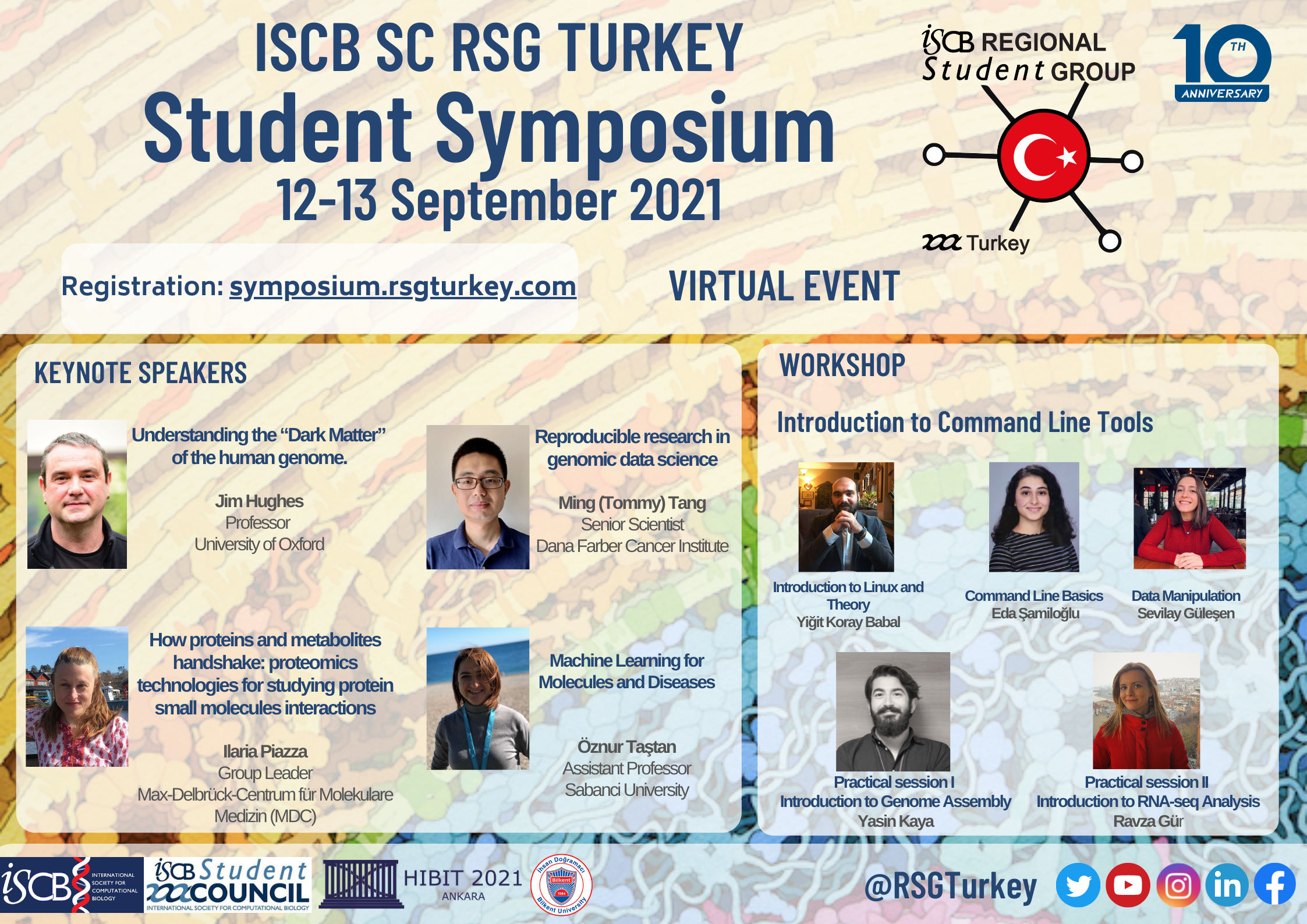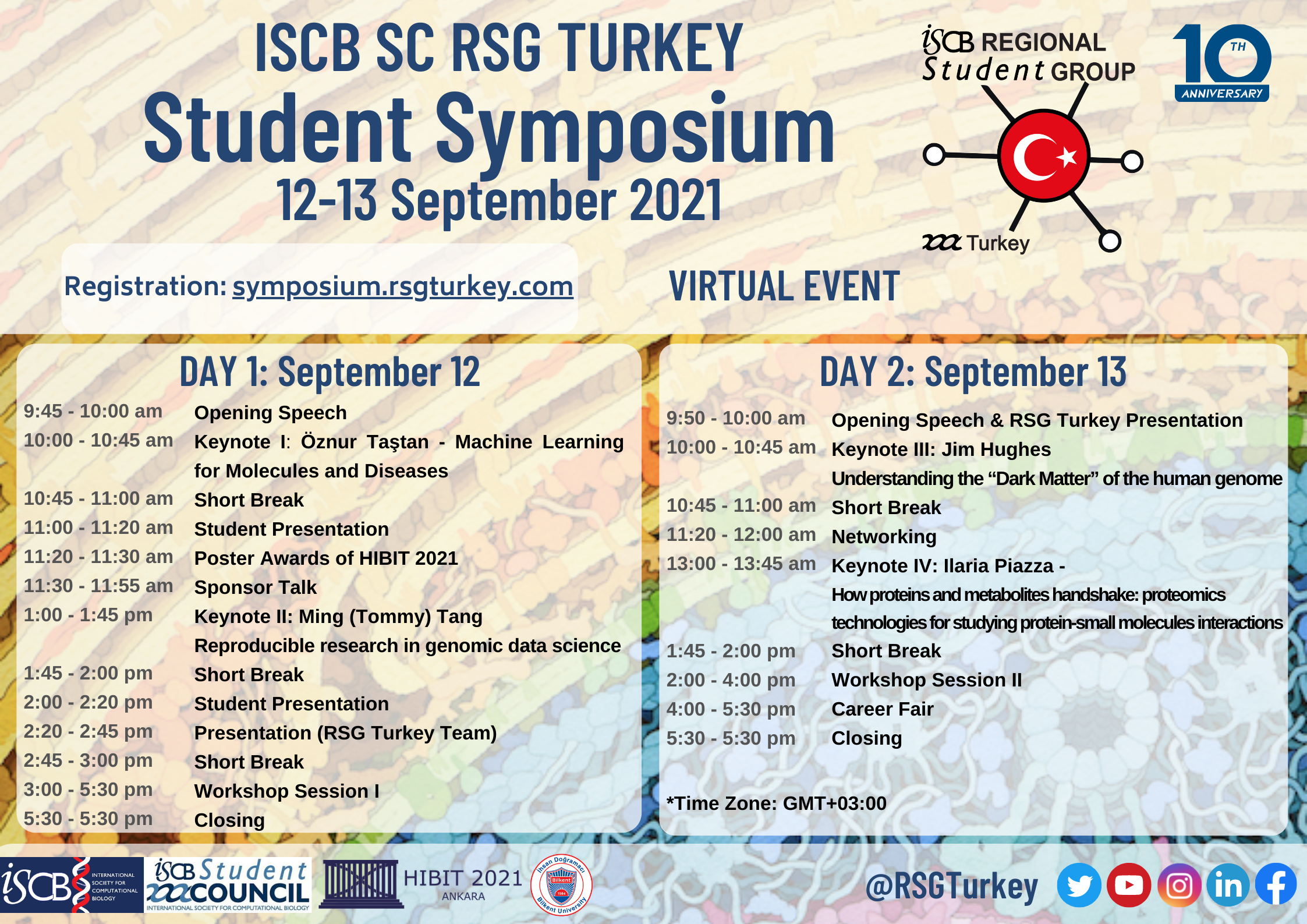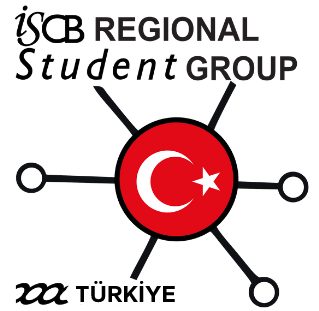
ISCB SC RSG Turkiye
ISCB SC RSG Turkiye has become a paramount student initiative, organizing events that contribute to the developing computational biology and bioinformatics society in Turkey.
We organize student symposiums attracting undergraduate and graduate students since 2012. We have been organizing our symposiums as satellite meetings to HIBIT (International Symposium on Health Informatics and Bioinformatics), which is the biggest bioinformatics meeting in Turkiye. Being less formal and student-oriented organization, our student symposiums has been successful in encouraging early career researchers to meet and exchange their expertise in the area.
About Symposium
12-13 September 2021
RSG Türkiye 8th Student Symposium
Öznur Taştan, our first keynote speaker this year, was with us with her presentation “Machine Learning for Molecules and Diseases”. Taştan is an Assistant Professor at Sabancı University Faculty of Engineering and Natural Sciences and has worked on various problems in the field of computational biology; her present efforts center on building machine learning models to advance the current understanding of complex diseases. In this statement, the speaker highlighted the potential of machine learning in addressing critical biological problems due to the richness and size of biological data. However, they emphasize the need to incorporate biological perspectives in a principled manner within machine learning formulations to achieve effective solutions. The speaker discussed various methods developed by their group in computational biology that successfully integrate biological knowledge into machine learning models.
The second keynote speaker, Ming Tommy Tang, was with us with his presentation “Reproducible research in genomic data science”. Tang, who is currently a senior scientist in the Data Science department at Dana-Farber Cancer Institute, is a computational biologist in cancer research with expertise in analyzing large- scale bulk sequencing data, single cell transcriptomic and epigenomics data, and developing bioinformatics tools. Ming Tommy Tang shared his personal experiences and insights on achieving reproducibility in genomic data science. He noted that while the use of large genomic datasets is common, much of the research in this field lacks reproducibility, making it difficult to build upon previous findings. Tang provided practical guidance on using various tools and techniques to ensure research can be replicated and built upon.
Our third keynote speaker Prof. Dr. Jim Hughes from Oxford University was with us with his presentation “Understanding the “Dark Matter” of the human genome”. Prof. Dr. Hughes worked on identifying and cloning genes responsible for inherited diseases, in the pre-genome era, uses molecular, genome engineering and synthetic biology approaches combined with bioinformatics and Machine Learning to investigate gene activity in health and disease. He introduced the concept of the genomic Dark Matter and highlighted the importance of advanced interdisciplinary approaches to unravel its role in health and disease.
Ilaria Piazza, the last speaker of the symposium, presented “How proteins and metabolites handshake: proteomics technologies for studying protein-small molecules interactions”. As a group leader at the Max-Delbrück-Centrum für Molekulare Medizin, Piazza’s team is working on the development of new Mass spectrometry-based proteomics technologies to study global structural changes in the proteome. Piazza’s talk revolved around the significance of protein-small molecule interactions in cellular responses. She described the use of a proteomic technique called LiP-MS to explore these interactions in bacteria and its more recent applications in studying the protein-small molecule interactome in human cells.
RSG Türkiye 8th Student Symposium – Workshop
On the first day of the workshop on “Introduction to Command Line Tools”, Yiğit Koray Babal from Gebze Technical University performed “Introduction to Linux and Theory”, Eda Şamiloğlu from Izmir Biomedicine and Genome Institute performed “Command Line Basics” and Yasin Kaya from Hacettepe University performed “Practical session I – Introduction to Genome Assembly”.
On the second day of the symposium workshops were held by Sevilay Güleşen from Kadir Has University, “Data Manipulation” and Ravza Gür from University of Oxford, “Practical session II – Introduction to RNA-seq Analysis”.
GitHub – Command Line Tools Workshop 2021

